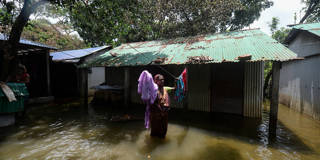The damaging effects of a warming planet are not limited to the environment. The United Nations Climate Change Conference (COP26) currently underway in Glasgow is an ideal opportunity for world leaders to demonstrate that they understand that global warming is a health crisis, and that they are learning from the pandemic response.
LONDON – The threat COVID-19 poses to human health is now well understood around the world. In contrast, the enormous health threat of global warming, with its broad array of persistent impacts on our well-being, is under-recognized and poorly understood.
Yet climate change is harming human health right now. During the 2020 monsoon season in Bangladesh, for example, water flooded a quarter of the country. More than 1.3 million homes were damaged, and hundreds of people died. Rising sea levels caused by climate change will make such events more frequent in low-lying countries like Bangladesh. It also will bring the risk of flooding on a similar scale to more communities around the world.
Severe floods do more than destroy homes. They cause raw sewage to flow into streets and contaminate drinking water, spreading infection. They also destroy crops, driving malnutrition. And rising sea levels turn drinking water saltier, which increases rates of high blood pressure, pre-eclampsia, and premature births.

LONDON – The threat COVID-19 poses to human health is now well understood around the world. In contrast, the enormous health threat of global warming, with its broad array of persistent impacts on our well-being, is under-recognized and poorly understood.
Yet climate change is harming human health right now. During the 2020 monsoon season in Bangladesh, for example, water flooded a quarter of the country. More than 1.3 million homes were damaged, and hundreds of people died. Rising sea levels caused by climate change will make such events more frequent in low-lying countries like Bangladesh. It also will bring the risk of flooding on a similar scale to more communities around the world.
Severe floods do more than destroy homes. They cause raw sewage to flow into streets and contaminate drinking water, spreading infection. They also destroy crops, driving malnutrition. And rising sea levels turn drinking water saltier, which increases rates of high blood pressure, pre-eclampsia, and premature births.